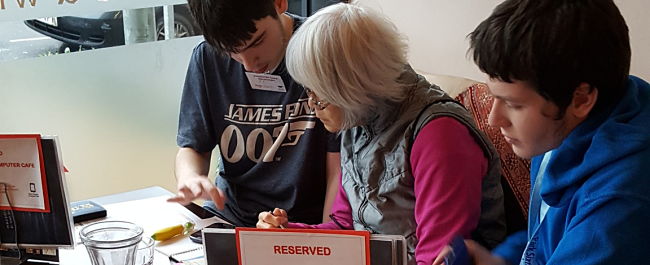Loneliness and social isolation: the need for community-led action

This research shows that loneliness affects the old and the young, and highlights the power of community-based solutions.
About the research
Social isolation and loneliness are increasingly issues of public concern, with recognition of the public health impacts of loneliness driving policy engagement nationally. Research undertaken by Bristol and Manchester Metropolitan (MMU) universities has demonstrated the importance of action focusing on community initiatives, through co-production of research and co-design of services at the hyper-local level. Findings emphasised that loneliness and social isolation need to be understood within community contexts. For example, local economies shape uses of public space: deprivation, unemployment and anti-social behaviour can contribute to disconnection within communities.
The research in Bristol was part of the Productive Margins programme. The team worked with groups of older co-researchers and local community organisations in Bristol and Merthyr Tydfil to explore new approaches to loneliness prevention. The Bristol group developed interview data into a series of stories about loneliness, the ‘Alonely Monologues’, which have been performed to audiences of all ages in London and Bristol. Audience responses informed the research findings, bringing in multigenerational perspectives on loneliness and prompting engagement with the MMU group, where youth co-researchers were exploring issues related to youth loneliness through arts-based and creative methods.
Across the projects co-production methodologies enabled research participants to take control, leading to the articulation of community-level perspectives on loneliness and social isolation that disrupt stereotypes and challenge stigmas, emphasising the diversity of people’s experiences of loneliness across the life-course.
Policy implications
There is a need to understand how people experience loneliness and social isolation across the life-course. Interventions such as community-based retirement classes could support the creation of more convivial, cooperative communities.
• Intergenerational engagement projects would provide spaces for younger and older people to share their experiences of loneliness. Skill sharing around technology can provide a focal point for engagement.
• Precarity and flux in service funding and provision undermines attempts to tackle loneliness. Services should be designed to encourage long-term trusting relationships. The role of interpersonal relationships in identifying and supporting people at risk of loneliness should be considered when implementing change in public and community services.
• Co-production of solutions to social isolation and loneliness requires a rethinking of research and project funding mechanisms. Support is needed for the slower exploratory work through which community-level solutions emerge. Funders need to be less directive of outcomes and more willing to place trust in community solutions.
• Further research is needed to explore the value of social media in reducing feelings of loneliness.
Key findings
• A multiplicity of risk factors for loneliness emerged across the research settings: older people in Merthyr Tydfil emphasised health and mobility, transport, digital capability, income and literacy. Bristol co-researchers focused on lifecourse transition points and stereotypical understandings of older identity. Identity and difference, poverty, families and relationships emerged as concerns for the Manchester young people’s group.
• Loneliness is not just a problem for older people. Points of transition such as retirement or leaving school can lead to loss of personal networks for friendship, support and advice. However, transitions can also be an opportunity for people to re/engage with their local community.
• Intergenerational skill sharing projects can help young and old people with feelings of loneliness. The Bristol coresearchers established ‘Tech and Talk’ to support older people in accessing technology. Intergenerational participation
developed organically from the nature of the project, bringing benefits to younger volunteers and older participants.
• Short funding cycles and shifting commissioning priorities within the Voluntary and Community Sector mean that projects have little time to build effective relationships and offer meaningful support. Instability and constant personnel change in key services undercuts relationships which may be particularly important for reaching the most isolated.
• Online communities can provide support for people experiencing loneliness, especially when used as an everyday tool for supporting positive relationships at the local level. However, social media use is not unproblematic, and can
contribute to anxieties and pressures which add to feelings of loneliness.
Policy Briefing 58: June 2018
Contact the researchers
Dr Helen Manchester, University of Bristol Project Lead Academic
Dr James Duggan, Manchester Metropolitan University Research Fellow
Ruth Green, Loneliness and Isolation Local Action Committee (LILAC, Bristol)
Further information
University of Bristol project:
https://www.productivemargins.ac.uk/projects/isolation-and-loneliness/
MMU project:
Authors
Jenny Barke, Ben Crawford, Helen Manchester and Morag McDermont (University of Bristol)
James Duggan (Manchester Metropolitan University); Ruth Green, Simon Hankins (BS3 Community Development)
Steve Franks, Carol Jubb, Alan Nye, Alexandra Pickford (Loneliness and Isolation Local Action Committee)
Related briefings



